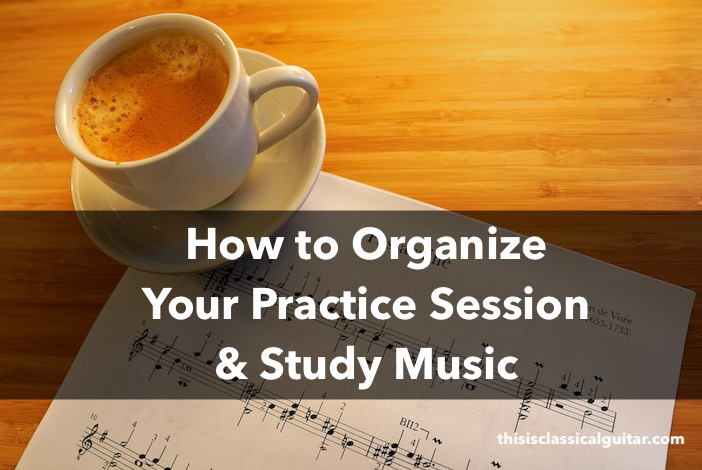
A lesson on how to practice music, classical guitar, and organize your practice session – I receive regular emails from my followers asking how they should organize their practice session so here’s a lesson on how to practice and learn music in general. Although I’ll focus on practicing guitar this lesson should apply to any instrument. This lesson is mainly for beginner and intermediate students as well as those new to the classical world. Of course, it all depends on your level and unique individual development but I’ll cover a broad overview of some concepts. Having a dedicated and qualified teacher will help you stay on track, choose materials, and focus your energy on what needs work. Follow your teacher’s advice but I hope this gives you some ideas to consider.
Overview of a Basic Practice Session
Practice the sections in the order presented below. Practicing in this order will promote good technique and mental health. Depending on your level you may dedicate more time to certain sections. This is a basic outline for an intermediate student. Absolute-beginner students will not necessarily follow such an organized format (more on that below).
Technique Routine – Start with a technique routine and preferably have it memorized so you can pick up the instrument and get to playing without fussing. Practice your technique first so all the playing afterward is influenced by good hand positions, sound, accuracy, and relaxation. I encourage classical guitar students to start with some easy basic open string exercises to focus the right hand and to help avoid mistakes when warming up. Then proceed to some basic left hand exercises and work your way up to more challenging material as you get warmed up and focused. You don’t want to make mistakes when your starting your session, you’ll feel more confident if you keep things nice and simple. A basic intermediate technique routine for classical guitar might include elements such as scales, arpeggios, slurs, barre, stretch, and finger independence exercises. The more advanced you are the more techniques you’ll need to maintain. My technique book has recommended routines for various levels: Beginner, Late-Beginner, Early-Intermediate, Intermediate, Late-Intermediate, Early-Advanced. Your technique section can include etudes but sometimes etudes will be part of the below section on learning, especially if it includes a technique you’ve never tried before.
Learning Materials (method books, etudes, sight reading, fretboard knowledge, research) – This section can involve anything that requires concentration. It’s a time to expand your mind and hands and widen your knowledge or technique base. Beginners and intermediates will often be working through some method books for this section. Method books might focus on how to read in various positions, learning new scales or chords, rhythm work, etc. More advanced students might be researching historical performance practices or ornamentation. Maybe a new technique will be explored such as damping/muting in the right hand. Advanced players will sometimes work on beginner methods to learn about pedagogy and approaches to various problems. There are endless method books to explore in the classical world or even jazz. You can check out my education series at Werner Guitar Editions.
New Repertoire – I like to always be learning at least one or two new pieces. They might be easy material or very difficult. New content expands our knowledge and challenges us to work through new musical ideas and fingerings. I’ll often be preparing pieces for way in the future. I’ll be playing it at 10% of the normal speed since I won’t need to play the piece for a few months. I may only work on the two difficult bars of a piece. Dealing with the hard parts before even thinking about playing the rest will help when I dive into it later. Guitarists can find new repertoire at my sheet music page.
Concert Repertoire – It doesn’t matter if you are playing concerts, recording pieces, or practicing alone, this is repertoire you are memorizing and playing at your highest level. This is the pinnacle of your playing and should be material you want play very well and confidently. This is serious practice time, so be organized and solve problems. It’s not a time to ‘just play’, it’s a time to resolve any musical or technical issues.
Enjoyment & Reward – In this section you should play some manageable pieces that you can play well without too much concentration or effort. Or anything that makes you feel good. You want to end your practice session feeling positive and to remember how far your progress has come. I often play some pieces that I’ve known for years or even from childhood. Never end your practice session in frustration, play that easy piece that you love even if you’ve played it thousands of times before.
Tips for Practicing: Context and Levels
Practice times – The quality of your practice is more important than the amount of time. I’d rather my students practice well for 10 minutes a day, every day of the week rather than 2 hours of rushed practice only on Sundays. Consistency, quality, and daily practice is best. Remember, practicing is problem solving not just playing. Below I recommend some practice times but, seriously, who cares? Practice well as often as possible, that’s all you need to know. Don’t over-practice, focus on the topics your teacher recommends. This will help you improve faster and more efficiently. If you practice for hours and add tons of additional material you might not be accomplishing what your teacher recommended or in the proper steps they’ve ordered for you. Keep it short and focused and repeat the same routine later in the day if you want to practice more. Quality of practice is very important because if you practice poorly you will only solidify poor playing habits. Increase your practice times as you become more knowledgeable and able to keep the quality high. Trim your times to cater to quality.
Beginners – Keep your practice sessions short, enjoyable, and to the point. Don’t worry, just play everyday and play as well as you are able. The majority of your practice will be from a single method book that keeps you on track and provides all the material you need. Don’t worry too much about having a massive technique routine as method book pieces are generally little technique exercises in their own way. If you have a difficult time being motivated to pick up the instrument, start with something you enjoy first. Whatever encourages you to play. Enjoy yourself, that is the most important thing. If you want to do extra, go watch some professional players play and watch their posture, hand positions, and listen to their beautiful phrasing. 15-20 minutes is fine for absolute-beginners but raise it to 30 minutes or more if you want. Just make sure you are practicing well.
Late-Beginners – At this point you can start taking the technique routine a bit more seriously as you’ll want to secure a foundation of technique and start expanding your skill set. Accomplishing a smooth legato and musicality is important. 30 minutes or more would be great.
Early-Intermediates – Time to start organizing your technique routine to include all the techniques that will be required and needed to be maintained. If you have any issues that are left over from being a beginner, start dedicating time to fixing them. 40 minutes or more would be ideal but you can still get away with 30 minutes if need be.
Intermediates – Your technique routine should now be fully established and etudes will start becoming an increasing area to focus your skills and diversify your technique. Also, going through multiple method books and systematic studies of the entire fretboard will be important. The reading requirement is going to start getting serious so include some reading methods into your practice so you can devour material more quickly. Many students don’t progress past this point if their reading skills are weak as learning new pieces will be too time consuming and drain your concentration. 45 minutes to 1 hour is preferable but only if it’s quality practice.
Late-Intermediates – Time to get everything in order. Technique, reading, musicality, knowledge, and relaxation. Tension issues are likely to cause injury at this level. 60 minutes or more of practice is recommended. You may want to take a solid break after 30 minutes and then start again later to make sure your concentration and quality remains high. Taking a solid break may also help you avoid injury.
Early-Advanced – At this level you hopefully have figured out the practice session and found your groove. If not, review the last levels or find a teacher fast to make sure you haven’t formed any bad habits or skipped over anything. Keep learning new stuff all the time, if you can’t find it in classical guitar books go to jazz books, devour anything and everything. I remember buying new method books every week, classical, jazz, bluegrass, folk, rock, anything that would teach me something new. I wanted to know everything. You may wish to start going through entire opuses of etudes such as all of Carcassi Op.60, or Giuliani’s Op.1, Part 3 studies to see if any of them give your trouble. It’s a time to find weak points in your playing and resolve them. 1.5 to 2 hours or more is recommended and likely needed; take breaks!
Advanced – I’m assuming anyone who reaches the advanced level has figured out the practice session and has had some great teachers to help them. Advanced etudes will be very important at this level. Exposing your own weaknesses and improving them will be key to your success. I’ve started picky etudes that I’m horrible at and then recording them for YouTube to force me to resolve issues in my playing. You have to let go of your pride and any thoughts that suggest you are advanced, we are all just students and need to remember that at all times. Remain open to ideas, accept critiques with open ears and never take offence. We need to re-evaluate constantly and challenge ourselves. Practice as much as life allows but don’t let your bad habit persist (we all have them, even the best pros).
Additional Content for Improving Music Practice
Throughout your practice sessions and your personal development new courses and information may be required. Serious students that are on a career path or exam system will need to complete additional courses along the way. More causal students can cover these topics with their teacher in the lessons or ‘on the side’. But there is no substitute for learning about music away from your instrument so you gain an awareness of the larger musical world.
Music Theory – Understanding the language of music is essential to becoming an advanced musician. Imagine trying to write books if you don’t know how to read or understand language! It’s an amazing world that will change your perception of music forever.
Musicianship – Working through ear training, sight singing, rhythm training and more will ensure you know music in your mind and body. You’ll be able to look at a piece of music (without your instrument) and know how it generally goes. It will help resolve blind spots in skills, especially for guitarists who are usually very preoccupied with their instrument.
Music History – Learning and listening to music will give you an awareness of the broader world of music. This will give you stylistic awareness appropriate to the era of music you’re performing. In general, students who have taken a good music history course (with listening exercises) will phrase better, listen better, and be more stylistically aware. They will sound more musically mature overall.
Chamber Music – It’s very important to play with other musicians, especially non-guitarists. There is a whole set of separate universal skills that musicians use to communicate with each other. I have learned more from playing chamber music with my ensemble partners than I did in lessons! It’s as if you absorb all their years of musical experience as you play, rehearse and communicate.
Secondary Instrument (piano recommended) – As a guitarist, learning piano really expanded my musical awareness and ideas about how to organize music. The instrument is so logical and straightforward that I could not hide behind the difficulties of guitar technique. Not that piano is easy, the music gets difficult quickly and the multitasking is incredible. On piano I had to be a solid musician. Also, piano reading is also on a whole other level, I feel I expanded my reading capabilities and multitasking skills by leaps and bounds. Good for the brain.
More Tips on Practicing Music for Beginners
Lesson: Repetition in Music Practice – Be sure to check out this important lesson on using repetition during your practice sessions.
Happiness in small goals: Making your practice sessions enjoyable will be key to long-term musical success and development. When experiencing difficulties, break up the piece or exercise into small manageable goals at a speed you can accomplish successfully. Even if you only play a few notes at a time, playing successfully will improve your skills and give you a feeling of accomplishment.
Isolate difficulties and solidify strengths: Balance your practice sessions by working on difficulties as well as maintaining easy material you can play well. Playing at a high quality level as often as possible will help develop a solid foundation. Work on your difficulties near the middle of your practice session and finish with something you can play well. This will ensure you end with a positive feeling of success.
Practicing is Problem Solving: Practicing is different than just playing the guitar. When you practice you need to identify problems or elements you wish to improve and solve them immediately. Simply playing the guitar will not make you a better musician. If your teacher says you should practice for 30 minutes a day, be sure you are actually practicing for 30 minutes not just playing.
Combine repetition with thoughtful practice: Although a certain amount of repetition is required to establish your skills, balance repetition with thoughtful reevaluation. Sometimes, improvement will occur by reexamining your posture, hand positions, or elements not directly connected to what you are studying. Having a qualified teacher is very helpful. They can identify problems before you repeat it a hundred times. That said, aim to be mindful at all times about what you are doing.
Reexamine your posture and hand positions often – Small adjustments in a number of places in your setup can make a big difference. Beginners need to constantly reevaluate.
Consider ergonomics on classical guitar – Beginners and intermediate students should closely watch for strange contortions and anything that is not ergonomic. Using a mirror can help.
Good days vs bad days: Actually, I don’t believe in good or bad practice days. All days are good opportunities to practice something. On days when you are having trouble focusing or executing material cleanly, slow down your speed and use a metronome until you are playing well. You may have to play at half the speed you intended but you can still get in some quality practice.
Play slowly: I’ve rarely encountered a student who practices as slowly as I think they should. Practicing ultra slowly will ensure you are playing with your best hand positions, sound, confidence, relaxation, accuracy, and more. The majority of your practicing should be at very slow tempos. Once you can play something well at a slow tempo, you can speed it up while keeping an eye on the quality level.
Dive deeper into musicality – Students can get super caught up in their own technique and progress but remember to strive for better phrasing, dynamic shaping, and overall musicality.
Page markers: Use page markers (sticky tabs) on the pages you are practicing so you can quickly flip to the next piece or exercise.
Keep it simple: Even the most advanced players will practice simple open string exercises but will do so at a very high quality level. Quality practice helps to improve your playing so keep the exercises and pieces simple enough that you can accomplish them at your highest potential. You don’t have to prove yourself to anyone. You‘ll only improve if you set realistic and manageable goals.
Play the melody on its own – If you can’t play the melody nicely on its own, how can you play all the notes? Learn to play the melody nice and legato first and introduce the rest of the notes after.
Listen to more music (not just guitar) – You must increase your awareness of the larger musical world. Guitar is great but it’s only a small niche and won’t inform you of all the musical eras diversity. Listen to piano, strings, symphonies, Bach cantatas, voice, lieder, and more.
Treat and reward yourself – Make your practice session an enjoyable and special time of your day. Have a treat or nice coffee or juice, buy that nice music stand and metronome.
Trust your teacher: If your teacher recommends something contrary to what’s on this site, please trust their advice. Your teacher knows what’s best for you and your personal and unique development. Learning from books and online videos can be helpful but the real work is done through long-term communication with teachers and other musicians that know you well and want to pass on their expertise.

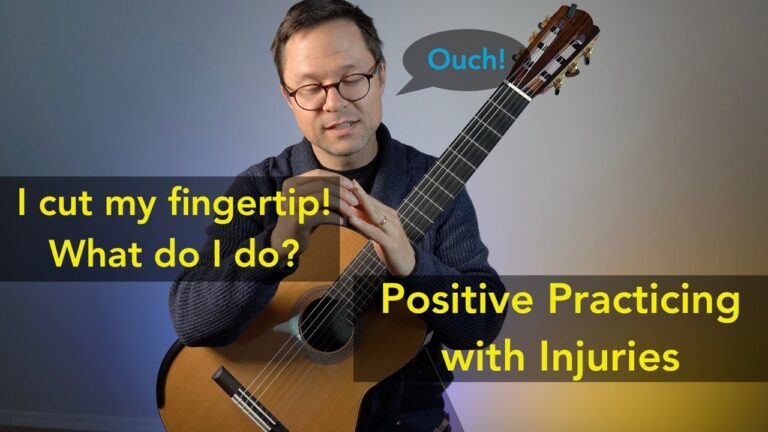
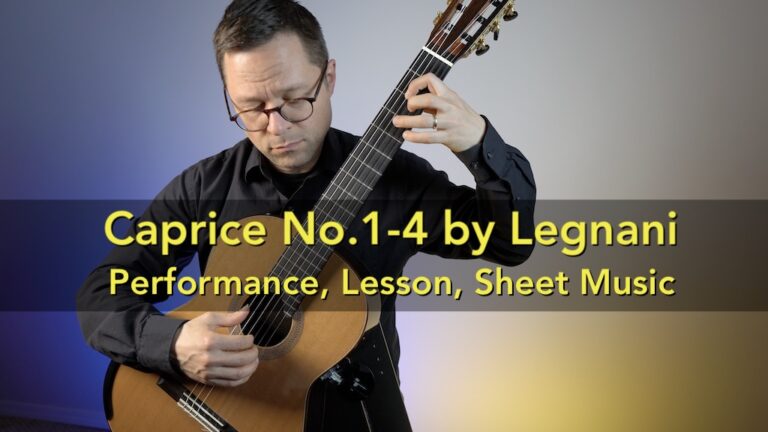
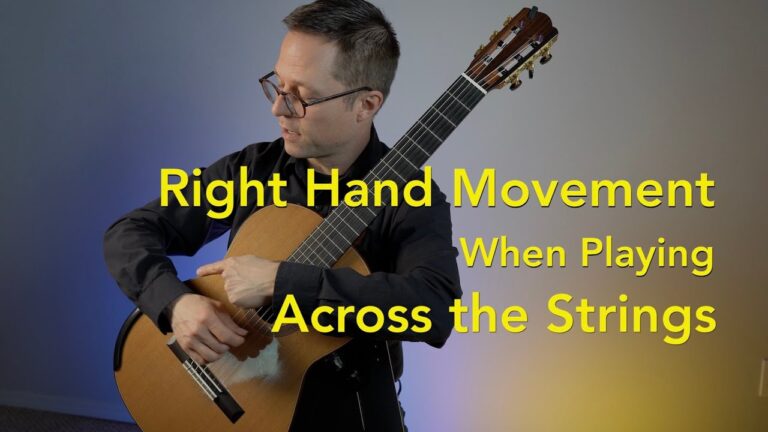
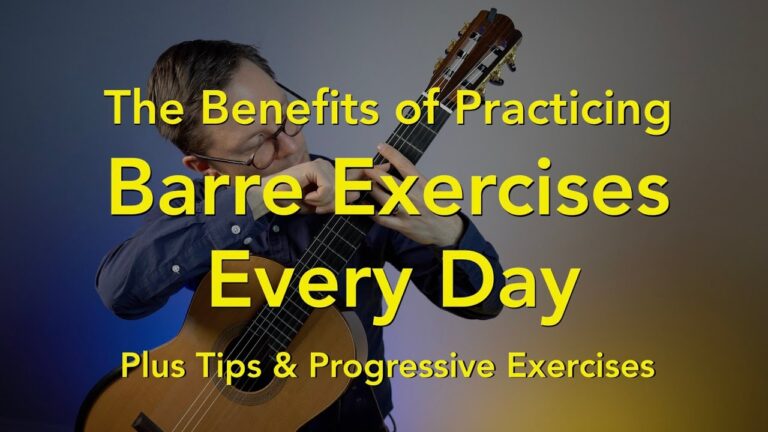
Hello
I’ve just finished yours Method Book 1. This post is first of all to say big “thank you” for sharing your knowledge and experience. But I want also to share my story as the proof of value of your method book, and video lessons.
I started my work at the end of Dec last year. I had some experience with western (acoustic) gitar around 30 years ago, I was so called “campfire guitarist” with basic fingerstyle skills and knowledge of intermediate level chords.I didn’t get to know neither notes nor tabulature, I have no knowledge on harmony, I never kept the guitar in a classical way, so 9 months ago I started from something minimally above 0 and I had the guitar (very old classical Hohner HC-06, made in DDR, somtehing like Yamaha C-40 but 40 years old, I changed it very quickly).
I started to work with your Method Book every day for about two hours (I didn’t miss even a day since Jan 01 🙂 ).
What I am able to do today:
– I’m able to keep the guitar in a correct way :-), with proper pressure on the strings, that supports f.e. sounding pull-offs
– I’m able to read rythm and notes, name them and find them on the fret for first position,
– I’m able to play every piece from your method book vol 1 (I skipped final chord section),
– I’m able to play several simple classical pieces from Jerry Willards book “50 easy classical … “.
– I have very basic sight reading skills (for me this skill is a kind of enabler for progression, or at least will make the progression faster)
The only things I added in my learning process was to play using metronome, a bit of additional sight reading exerciess and technical exercises for left hand streching and finger independence).
From my perspective the progression was faster than I expected, and I evidently see that the learning curve has becoming more steep week after week.
So, thank you again for Vol. 1, your excellent and invaluable videos. Tomorrow I’m starting Vol. 2.
Great to hear that it was all helpful! Enjoy yourself and happy practicing!
Lieber Werner,
Ich liebe die Musik von Händel, Bach, Scarlatti etc. Und spiele öfters bei Andachten in der Kirche oder bei Bibelstunden.
Was ich Dir eigentlich sagen will: Ich bin begeistert von Deinen Büchern, aber vor allem von Deinen Hinweisen zum Üben. Mit neuem Mut und Freude gehe ich an meine Übe-Arbeit und danke Dir dafür.
Danke!
Thank you very much this information is greatly appreciated.
Found your site as I’m getting back into playing classical guitar after a long (18 year!) hiatus. Already so amazed by the resources and instruction you provide free of charge!
Having a sound practice routineis vital,and thankyou for your technique book. But i really struggle tryjng to learn notes on the fretboard. Is there a way to gain this abillity, ive tried the all As all Bs All Cs on all strings up to the 12th fret for along time but,need something that works in a more defining wa.
Hi Malcolm, have you worked through method books? I have a Volume 1 and two method followed by a graded Repertoire Lessons book series that gradually introduce notes and areas of the guitar while giving you practice along the way. It’s really tough to learn it from a guitar theory book. That said, I will have Fretboard Orientation book coming soon but it will note be very gradual so I recommend using my other books first!
Thank you for this complete and really useful article. I come to it at least every week, specially when I think I am loosing track with my practice. I always find something that I was missing that helps me to stay focused again. I try to pay special attention to keep it simple and play as slow as I can to identify problems and bad habits. Almost there to begin with the second book of your method.
I really wanted to learn finger style playing, perhaps some pop rock kind of music, do you recommended starting with classical guitar method?
Not necessarily, there are lots of great fingerstyle methods these days to check out. My methods (Volume 1 and 2) are good for both though as I think classical and fingerstyle players generally need to learn the same things at first and then branch out later. The big difference is how we hold the instrument etc…
Actually, I just found your page dealing with the exact thing I just asked. I’ll have a look at it.
Thanks Bradford – just a great article and great advice. After Covid has quieted down, we will become members (giving every extra dime we can now to various humanitarian charities) and do our share to help maintain the really fine work that you do. I am my daughter’s remote teacher this year, but the Covid lockdown has also increase her available practice time – but like you (she has just turned 10), I try to keep it both basic (scales and techniques), challenging (varied site reading and pieces), and fun (lot’s of simple duets we do together, and so forth). She is making fine progress and your site helps provide a base for that progress – again, thanks. Skip (and Alex) Cutting – Carbondale, Illinois.
Nice to hear, enjoy!
Happy practicing.
Thank you for this wonderful article and very valuable advice!..Also wanted to ask you how do you manage your right hand nails while playing both Piano and guitar..any tips…as in.. do you recommend to keep it short, so not to affect attacking angle while you switch between both instruments?
Thanks!!
Ha, it’s an issue. I just let mine click and clank away on the keys. It’s super annoying and my wife is a pianist and piano teacher so she can’t stand it! But even some minimal piano playing is useful.